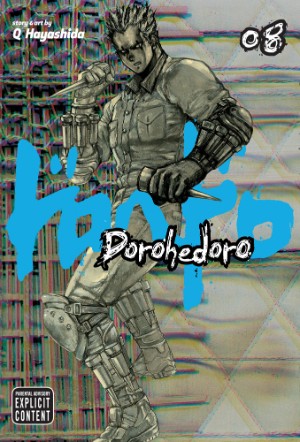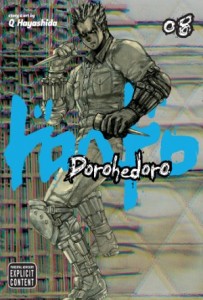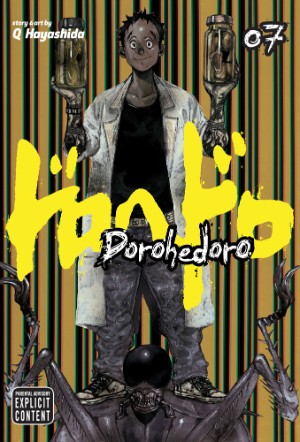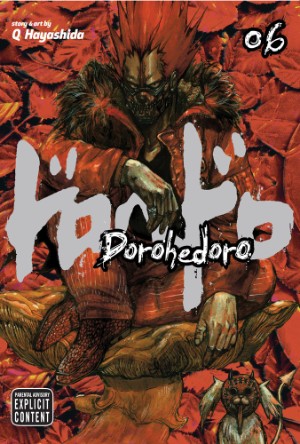By Q Hayashida. Released in Japan by Shogakukan, serialization ongoing in the magazine Ikki. Released in North America by Viz.
I’ve said a few times before that I don’t really read Dorohedoro for the plot, and it’s true. This is the sort of series that is best experienced by, when a new volume comes out, re-reading every previous volume just to remind yourself of all the little details. Since I don’t do that, I’m constantly forgetting things. But even I have to admit that the main plotline is starting to actually give us more than vague hints here. The Cross-Eyes are becoming more and more important, and Risu and Caiman’s search looks to be the same one, from different angles. Most of all, we meet a guy in a flashback who I have a sneaking suspicion is the one man tying this all together.
All right, enough of the plot. Let’s go back to talking about violence and humor, which are still this manga’s main fuel. Hayashida excels at writing grotesque action scenes filled with gore, and we certainly get that here. The highlight is probably Shin headbutting a man so hard his brain goes flying out the back of his head. I mean, this series isn’t rated M just for the breasts, you know. And quite often the violence and humor combine, such as the fate of the Cross-Eyed’s landlady, which is both horrible and yet somehow amusing. It’s hard to take an evil gang seriously when they’re such schlubs, and I can’t imagine what new bright-eyed character Natsuki sees in them.
The other thing threading through this entire series is drug use and abuse. The way magic works in this universe involves a lot of ‘black powder’ being sold to help non-magic users get a quick fix. Though they’re running out, so they’re starting to sell off some coarser fakes that aren’t as pure. No prizes guessing what the metaphor is here. Meanwhile, En is basically trying to build a new and better hallucinogenic mushroom, and finds that while it makes your wildest dreams come true, the comedown afterwards is rather harsh (poor Fujita…). I have to think at this point that En is aware that Chota is impersonating Nikaido and is just giving him enough rope to hang himself, given Chota’s pathetic attempts at impersonation.
But as always, it’s the relationships and friendships between everyone that are the main reason to read Dorohedoro. Shin may not have a crush on Noi the way she does on him, but his single-minded devotion to finding her is impressive to see. Nikaido and Caiman have swung back into their old groove, though I’m not sure how long that will last. Seeing Dr. Kasukabe reunite with his wife (who has a surprise new job!) is bittersweet but also rather touching, and I hope we see more of her soon. And then there’s Ebisu and her dream of her parents, reminding us that she is more than just comedy relief but a broken young girl.
I still can’t think of a dystopian title I’m enjoying more than Dorohedoro. I know that things will get much worse for everyone soon, but for once I’m actually looking forward to it. This cast does better when its backs are against the wall. And most importantly: will we see more of the Gyoza Fairy?





